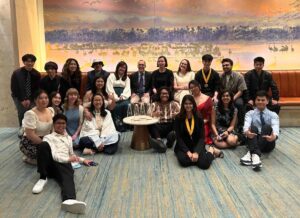![Empire of Funk_1[1]](http://skylinecollege.edu/skylineshines/wp-content/uploads/sites/3/2014/04/Empire-of-Funk_11-300x225.jpg) The Kababayan Learning Community and the Center for Innovative Practices through Hip Hop Education and Research (CIPHER) hosted a book launch last week in the Multicultural Center Hosting Gallery for Empire of Funk: Hip Hop and Representation in Filipina/o America. This two-day panel on April 16th and 17th featured artists Mario “Nomi” de Mira of Power Struggle, Hopie Spitshard, and Leo Docuyanan; activists and community organizers DJ Kuttin Kandi and Leo Esclamado; as well as educators Dr. Roderick Labrador, Professor of Ethnic Studies at University of Hawai’i, Mānoa and Mark Villegas, Ph.D. candidate in Culture and Theory at UC Irvine, along with Skyline College’s own Nate Nevado and Janice Sapigao. These contributors to the anthology spoke on their experiences as Filipin@s in Hip Hop, part of an incorporated lesson in the Kababayan Learning Community’s English 100 courses taught by Liza Erpelo.
The Kababayan Learning Community and the Center for Innovative Practices through Hip Hop Education and Research (CIPHER) hosted a book launch last week in the Multicultural Center Hosting Gallery for Empire of Funk: Hip Hop and Representation in Filipina/o America. This two-day panel on April 16th and 17th featured artists Mario “Nomi” de Mira of Power Struggle, Hopie Spitshard, and Leo Docuyanan; activists and community organizers DJ Kuttin Kandi and Leo Esclamado; as well as educators Dr. Roderick Labrador, Professor of Ethnic Studies at University of Hawai’i, Mānoa and Mark Villegas, Ph.D. candidate in Culture and Theory at UC Irvine, along with Skyline College’s own Nate Nevado and Janice Sapigao. These contributors to the anthology spoke on their experiences as Filipin@s in Hip Hop, part of an incorporated lesson in the Kababayan Learning Community’s English 100 courses taught by Liza Erpelo.
 The panels, engaging students, faculty, and community members, provided a conversation space around Filipina/o American hip hop aesthetics, community building, the geography of Hip Hop in Filipina/o America, sexuality and power, activism and praxis, visual culture, and navigating the Hip Hop industry. The conversation continued beyond Skyline College as the contributors to Empire of Funk also presented a panel at this year’s Association for Asian American Studies conference in San Francisco on April 19th as well as a book launch celebration later that night at Oakland’s Institute for Sustainable, Economical, Educational and Environmental Design (I-SEED).
The panels, engaging students, faculty, and community members, provided a conversation space around Filipina/o American hip hop aesthetics, community building, the geography of Hip Hop in Filipina/o America, sexuality and power, activism and praxis, visual culture, and navigating the Hip Hop industry. The conversation continued beyond Skyline College as the contributors to Empire of Funk also presented a panel at this year’s Association for Asian American Studies conference in San Francisco on April 19th as well as a book launch celebration later that night at Oakland’s Institute for Sustainable, Economical, Educational and Environmental Design (I-SEED).
The book gives readers a thoughtful introduction to an often-overlooked aspect of American society and culture. It can be used in courses dealing with race and ethnicity, American youth culture, popular culture in America, and immigrant communities.
Quotes from the book:
 “We hope that this book will be a start of a bigger conversation about the role Hip Hop has played in the lives of Pilipina/o Americans. It’s just begun. For many ethnic groups who became integral parts of Hip Hop, the culture was dismissed as a passing fad. But in reality, Hip Hop has decided to stay in Pilipina/o American communities, and actually has become for us a main mode of expression and a crucial method of organizing.”
“We hope that this book will be a start of a bigger conversation about the role Hip Hop has played in the lives of Pilipina/o Americans. It’s just begun. For many ethnic groups who became integral parts of Hip Hop, the culture was dismissed as a passing fad. But in reality, Hip Hop has decided to stay in Pilipina/o American communities, and actually has become for us a main mode of expression and a crucial method of organizing.”
– DJ Kuttin Kandi, “Introduction: A Hip Hop Story to Tell: It’s Just Begun”
“Hip-hop comes from the specificity of the urban U.S. version of Afrodiasporic Blackness–that is undeniable–but it has also always been open to the presence of multiraciality and polyculturalism. Our question should not be how to privilege one of these facts over the other, but how to understand their co-evolution, and their implications for cultural strategies to eradicate racism and anti-Blackness.”
– Jeff Chang, “Foreword: For the Moment”
To find out more about Empire of Funk or to purchase a copy of the book, please visit http://empireoffunk.com/. For more information about the Kababayan Learning Community, please contact Liza Erpelo at erpelol@smccd.edu. For more information on CIPHER, please contact Nate Nevado at nevadon@smccd.edu or log on www.skylinecollege.edu/cipher.
Article by Melanie Espinueva | Photos taken by Liza Erpelo






